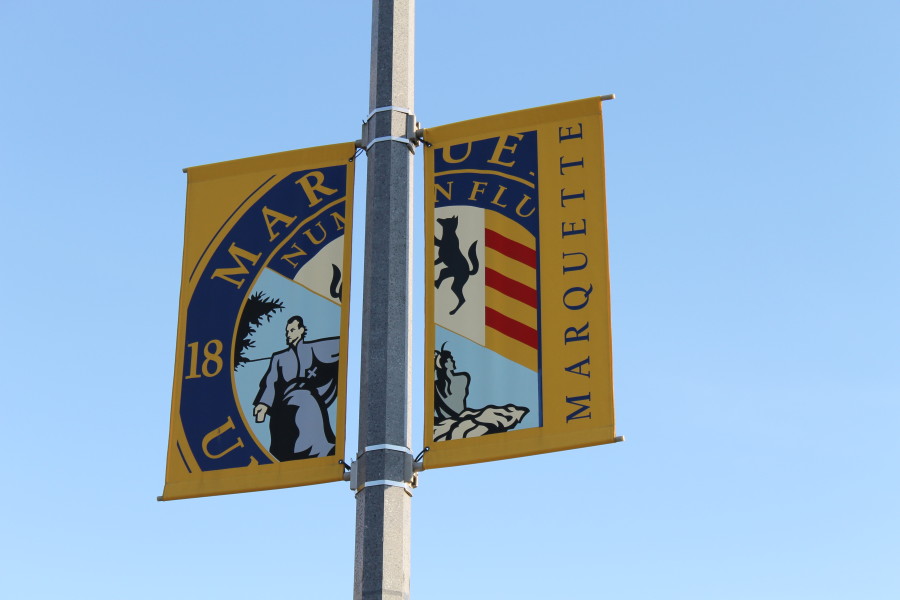
Uhle’s Tobacco Company at 114 W. Wisconsin Ave. is a small cigar shop and smoking lounge nestled between the flashing marquee of the Riverside Theater and the Milwaukee River. The shop, frequented by Marquette students and Milwaukee residents alike, is a popular local destination for smokers.
Jeff Steinbock, president of the company, has owned the shop for 38 years. He greets his customers leaning against the counter with a lit cigar in hand.
“I started this job when I was 19 years old,” Steinbock said. “This industry really becomes a passion. We’ve got the best customers in the world. It’s a lot of fun; it’s not even like working.”
Uhle’s, which was founded by John (Jack) Uhle, has been in Milwaukee since 1939, making it the oldest tobacco company in the city. The company developed a wholesale business that sells its products to agencies throughout the Midwest.
As a tobacco retail store, Uhle’s is an exemption to the indoor smoking ban in Wisconsin, making it one of the only businesses in Milwaukee where people can smoke cigars indoors. Almost every Saturday morning, a crowd of Uhle’s regulars comes to the store to take advantage of its smoking lounge.
One regular, Jim Masters, a former Uhle’s employee, has been visiting the tobacco shop since 1960. Masters, who is not a smoker, travels half an hour from Mukwonago to the smoking lounge nearly every Saturday morning.
“There’s a camaraderie that you get if you stick around here long enough,” Masters said. “There’s a generally relaxed and friendly atmosphere in the place.”
Doug Stoneman, who has been visiting Uhle’s regularly since 1997, sees his trips to Uhle’s as an important part of his life.
“It’s kind of an imperative for me to come here because I enjoy the people,” Stoneman said. “We can talk about stuff and get a camaraderie that’s mellowed with age and experience. It gives me a social outlet that’s not work or everyday life. That’s very important to me.”
Dan Rush, a World War II veteran, has been visiting the shop since 1947. Rush said the most exciting part about visiting Uhle’s is the political conversation he has with his companions.
“You bring the topic up and we’ll talk,” Rush said. “Some of us know everything about everything. We don’t discuss football or baseball.”
“We’re one of the few places where, when we discuss things, we must have one of these on hand,” Stoneman added, pulling a copy of the U.S. Constitution from one of the lounge’s drawers.
Challenges of construction on the Wisconsin Avenue Bridge
Despite its popularity, Uhle’s has recently faced many challenges as a small business in Milwaukee. On top of a slow economy and competition from Internet-based tobacco companies, Uhle’s business shrank substantially during the construction on the Wisconsin Avenue Bridge.
“I lost a lot of revenue due to the construction,” Steinbock said. “Nobody walked by the front of the store; only the regular customers came in.”
The bridge’s rehabilitation project lasted almost a year, from early Oct. 2011 to Sept. 22, 2012. According to the Wisconsin Department of Public Works, the project extended the life of the bridge by an estimated 45 years.
Regular customers noted the painful effect the construction had on the business. Stoneman believes the business would have gone under had it not been a hotspot for cigar smokers.
“If Uhle’s was selling anything else, it wouldn’t be here,” Stoneman said. “The only reason why they are alive is because loyal customers knew where it is and because it’s cigar-Nazi free.”
According to Jeffrey Polenske, a city engineer for the City of Milwaukee, construction on the bridge was necessary, as it was at the end of its useful life due to the high daily traffic on Wisconsin Avenue.
Steinbock, however, believes that lack of city maintenance may have had an effect on the bridge’s deterioration.
“I saw the bridge being put in in 1975,” Steinbock said. “In the time it’s been here, I never saw anybody out there with a paint brush. I’ve seen no maintenance.”
Polenske did not comment directly on the frequency of the bridge’s maintenance prior to the 2011 rehabilitation project.
“In accordance with state and federal requirements, we inspect our bridge inventory a minimum of every two years,” Polenske said in an email. “From these inspections we develop a bridge capital improvement and maintenance program to meet the needs and conditions of our bridges.”
When the city received federal TIGER grants through the Department of Transportation, rehabilitation projects for the Wisconsin Avenue Bridge and the Juneau Avenue Bridge were put into motion.
“The TIGER grant was a significant benefit to the city,” Polenske said. “Typical state and federal funds that are available for these kinds of projects are limited, and it was likely that the city would have had to budget for the Wisconsin Avenue and the Juneau Avenue bridges exclusively with city funding. Because of the higher costs associated with these movable bridges, this would have put a strain on the city budget and the local taxpayers.”
According to the Department of Public Works, a total of $23.8 million was granted through federal stimulus money for the rehabilitation of the Wisconsin Avenue and Juneau Avenue bridges. The entire project cost about $30.5 million.
While the timing of the stimulus package worked very well for the bridge’s rehabilitation project, it cut deep into many of the businesses surrounding the construction site.
Amanda Gotto, manager of Mo’s Irish Pub at 142 W. Wisconsin Ave., believes the construction on the bridge negatively affected her business.
“Things slowed down considerably,” Gotto said. “Our out-of-town customers who did not know their way around the detours were deterred from coming here.”
Polenske said the city made efforts to reach out to businesses throughout the construction process.
“We recognize the challenges that street and bridge construction can have on businesses,” Polenske said. “As part of the Wisconsin Avenue and Juneau Avenue bridge projects, we placed incentives and disincentives in the construction contract to give us greater assurance that the project would be completed in the most expedient way. A business support liaison was assigned to these projects to provide a high degree of communication very early on in the design phase through construction.”
The city also put up signs near all detour points that listed the shops that remained open during the construction period.
Despite the city’s efforts to support local businesses, Steinbock does not believe the city supported Uhle’s Tobacco effectively throughout the construction process.
“The city claims they help their retailers,” he said. “Don’t believe them. They’ve done nothing for me.”
Tension between the city and its business owners
While the construction on the bridge hurt relations between businesses like Uhle’s and the city, it was not the only problem the city has brought to its businesses, Steinbock said.
“What really frustrates me is what the city has let Wisconsin Avenue become,” Steinbock said. “Where do you shop? Wisconsin Avenue should be the jewel of downtown Milwaukee, and it’s not. They’re way too aggressive and expensive on their parking.”
For regulars such as Jim Masters, potential threats to the business mean potential threats to his lifestyle.
“If Uhle’s were to go out of business, and this is a non-smoker talking, there would be a hole in my life,” Masters said. “I look forward to coming down on Saturdays, sitting down with these guys, and solving the world’s problems.”


